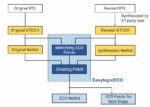Modern SoCs can be complex with hundreds to thousands of IP blocks, so there’s an increasing need to have a front-end build and assembly methodology in place, eliminating manual steps and error-prone approaches. I’ve been writing about an EDA company that focuses on this area for design automation, Defacto Technologies, and … Read More
Tag: rtl
Reset Domain Crossing (RDC) Challenges
In the early days an IC had a single clock and a single reset signal, making it a simple matter to reset the chip into a known, stable state, so there was little need for detailed analysis. For modern designs there can be dozens to hundreds of clocks, creating separate domains and some use of asynchronous resets, so the challenge of ensuring… Read More
Easy-Logic and Functional ECOs at #61DAC
I first visited Easy-Logic at DAC in 2023, so it was time to meet them again at #61DAC in San Francisco to find out what’s new this year. Steven Chen, VP Sales for North America and Asia met with me in their booth for an update briefing. Steven has been with Easy-Logic for six years now and earned an MBA from Baruch College in New York. This… Read More
Defacto Technologies and ARM, Joint SoC Flow at #61DAC
At #61DAC I stopped by the Defacto Technologies exhibit and talked with Chouki Aktouf, President and CEO, to find out what’s new in 2024. ARM and Defacto have a joint SoC design flow by using the Arm IP Explorer tool along with Defacto’s SoC compiler, which helps to quickly create your top-level RTL, IP-XACT and UPF files. This tool… Read More
AMIQ EDA Integrated Development Environment #61DAC
I stopped by the AMIQ EDA booth at DAC to get an update from Tom Anderson about their Integrated Development Environment (IDE), aimed at helping design and verification engineers save time. In my early IC design days we used either vi or emacs and were happy with having a somewhat smart text editor. With an IDE you get a whole new way … Read More
Something new in High Level Synthesis and High Level Verification
As SoC complexities continue to expand to billions of transistors, the quest for higher levels of design automation also rises. This has led to the adoption of High-Level Synthesis (HLS), using design languages such as C++ and SystemC, which is more productive than traditional RTL design entry methods. In the RTL approach there… Read More
New Tool that Synthesizes Python to RTL for AI Neural Network Code
AI and ML techniques are popular topics, yet there are considerable challenges to those that want to design and build an AI accelerator for inferencing, as you need a team that understands how to model a neural network in a language like Python, turn that model into RTL, then verify that your RTL matches Python. Researchers from CERN,… Read More
ECO Demo Update from Easy-Logic
I first met Jimmy Chen from Easy-Logic at #60DAC and wrote about their Engineering Change Order (ECO) tool in August 2023. Recently we had a Zoom call so that I could see a live demo of their EDA tool in action. Allen Guo, the AE Manager for Easy-Logic gave me an overview presentation of the company and some history to provide a bit of context.… Read More
Afraid of mesh-based clock topologies? You should be
Digital logic chips synchronize all logic operations by using a clock signal connected to flip-flops or latches, and the clock is distributed across the entire chip. The ultimate goal is to have a clock signal that arrives at the exact same moment in time at all clocked elements. If the clock arrives too early or too late from the PLL… Read More
Handling metastability during Clock Domain Crossing (CDC)
SoC designs frequently have lots of different clock domains to help manage power more efficiently, however one side effect is that when the clock domains meet, i.e., in a Clock Domain Crossing (CDC), there’s the possibility of setup and hold time violations that can cause a flip-flop to become metastable. Synchronizer … Read More










